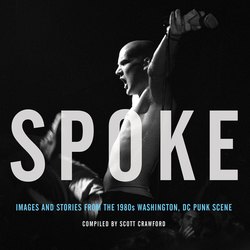Читать книгу Spoke - Scott Crawford - Страница 11
На сайте Литреса книга снята с продажи.
Оглавление“Every Black Market Baby story starts off with, We was all drunk one night . . .” —BOYD FARRELL
Black Market Baby WERE the most gloriously odd men out in the DC scene. They were never a “hardcore” band for one, remaining a true punk rock band in the most 1977 sense of the term. They were also older than their peers, and proudly “bent edge,” as brash/loud/snotty vocalist Boyd Farrell once explained to a fanzine editor, saying they were never going to draw X’s on their hands. The band drew heavily on the stomping, anthemic songwriting of UK bands like The Clash and Sham 69, and the delinquent energy of US louts like The Dead Boys, though it would be Farrell’s melodic yet phlegmatic singing and Keith Campbell’s rampaging rock ’n’ roll guitar work that would be their trademarks, even across varying hard-stomping rhythm sections. Raw shout-alongs like “Potential Suicide” and “Downward Christian Soldiers” still have the power to thrill to this day. Black Market Baby made a difference, in part by being different. —Tim Stegall
9:30 CLUB, DC, 1983 (Jim SAAH)
BOYD FARRELL: Albums like Highway to Hell were just as important to us as Road to Ruin at the time. I think that’s what made us different.
JOHN STABB: Black Market Baby were one of my biggest influences. I almost think of them as the DC’s answer to The Heartbreakers or The Damned. They had much more of a NYC vibe to them. But their crowd could be scary. You didn’t wanna get in a fight with those guys.
KENNY INOUYE: I never wanted to miss a Black Market Baby show.
TESCO VEE: Black Market Baby was a hard-rock band and a damn fine one at that. Though lumped in with the “punk” scene, these bumpkins from the Maryland suburbs sported stellar players, crafty songwriting, and were always a rockin’ great time live. Though never fitting into or qualifying for inclusion in the Dischord catalog, BMB remains one of the all-time great rock combos to emerge from the DC area. Period.
BOYD FARRELL: I was a redneck from PG County.
MIKE DOLFI: In lieu of payment, we would play for beer.
BOYD FARRELL: I gotta say, we probably cultivated our crazy, drunken redneck punk reputation a bit. It suited us—because it wasn’t too far from the truth.
IAN MACKAYE: I loved Black Market Baby. They were inspirational. I saw them every time they played. But they were guys who were older than us and coming at it from a different place than we were. They had managers and they used contracts. People used to ask, Why aren’t they on Dischord? But when they were big in ’83, ’84, we were a tiny label. I think largely they thought we were a joke. We were the little kids doing a little label.
BOYD FARRELL: I remember being a little peeved when we weren’t asked to be on Dischord. But looking back, I can understand why they wouldn’t have wanted us representing them.
Boyd FarrelL, Mike Dolfi, Wilson Center, DC, 1983 (Jim SAAH)
MIKE DOLFI: I used to use squirrel sperm to spike my hair.
DANNY INGRAM: The thing that always impressed me about them, aside from their songs and skill as musicians, was the gang-like mentality that they had as a band. They didn’t seem to care how people perceived them. And I think this served them well, because my perception was that, for some, Black Market Baby were not immediately accepted as part of the nascent DC punk scene—even though they had created their footprint before many of us.
BOYD FARRELL: I remember doing an interview and somebody asked us if we were part of that straight-edge movement and I just said, “No, not really, we are a little bit more bent edge,” and then we started hearing bent edge all the time. I think when the straight-edge thing started to happen, that’s when it kind of split—it seemed like all the sort of malcontents, more like the guys who liked to do drugs and drink and all that stuff, they sort of drifted to us and we became their band.
MIKE DOLFI: I think when the straight-edge thing came around, that really split people into two different [camps]. “I still love your music but do I show up there because I have been drinking, or do I show up there because I haven’t been drinking?” That’s when, for me, the whole punk community started going its own way.
9:30 CLUB, DC, 1983 (JIM SAAH)
MIKE DOLFI: We used to piss in the back alley of the 9:30 Club when we’d play there. It wasn’t until years later I realized I was pissing on the back wall of Ford’s Theatre.
